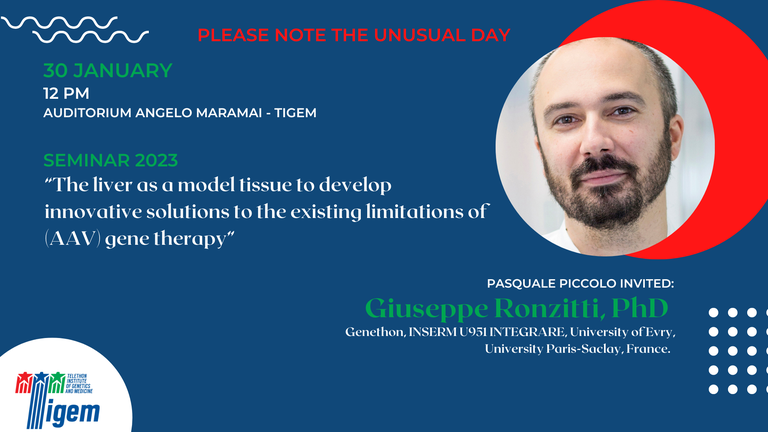Giuseppe Ronzitti, PhD - "The liver as a model tissue to develop innovative solutions to the existing limitations of (AAV) gene therapy"
- When Jan 30, 2023 from 12:00 PM to 01:15 PM (Europe/Berlin / UTC100)
- Where Tigem Auditorium Angelo Maramai
- Contact Name Pasquale Piccolo
- Contact Phone 08119230659
-
Add event to calendar
iCal

- https://www.tigem.it/giuseppe-ronzitti-phd-the-liver-as-a-model-tissue-to-develop-innovative-solutions-to-the-existing-limitations-of-aav-gene-therapy
- Giuseppe Ronzitti, PhD - "The liver as a model tissue to develop innovative solutions to the existing limitations of (AAV) gene therapy"
- 2023-01-30T12:00:00+01:00
- 2023-01-30T13:15:00+01:00
Giuseppe Ronzitti, PhD (Short CV)
Genethon, INSERM U951 INTEGRARE,
University of Evry,
University Paris-Saclay, France
Abstract
Liver gene transfer with AAV vectors has become a clinical reality. However, limitations remain that preclude the use of AAV vectors in larger patient populations. Through my presentation I will discuss the strategy of my team, oriented to the overcoming of current AAV gene transfer limitations. In particular I will discuss how we are tackling two important AAV limitations i.e. the humoral immunity and the toxicities associated to liver overloading in neuromuscular diseases. In particular I will discuss the recently reported use of IdeS endopeptidase to degrade anti-AAV immunoglobulins as well as show unpublished data on the development of new AAV capsids with a methodology developed in our laboratory.
Genethon, INSERM U951 INTEGRARE,
University of Evry,
University Paris-Saclay, France
Abstract
Liver gene transfer with AAV vectors has become a clinical reality. However, limitations remain that preclude the use of AAV vectors in larger patient populations. Through my presentation I will discuss the strategy of my team, oriented to the overcoming of current AAV gene transfer limitations. In particular I will discuss how we are tackling two important AAV limitations i.e. the humoral immunity and the toxicities associated to liver overloading in neuromuscular diseases. In particular I will discuss the recently reported use of IdeS endopeptidase to degrade anti-AAV immunoglobulins as well as show unpublished data on the development of new AAV capsids with a methodology developed in our laboratory.
